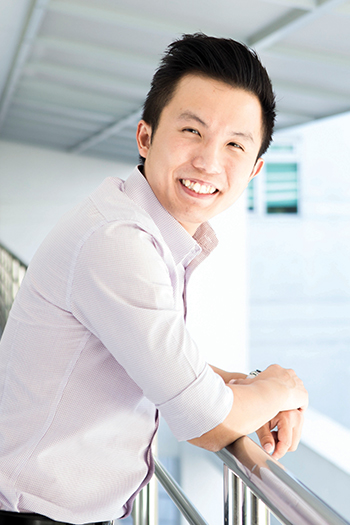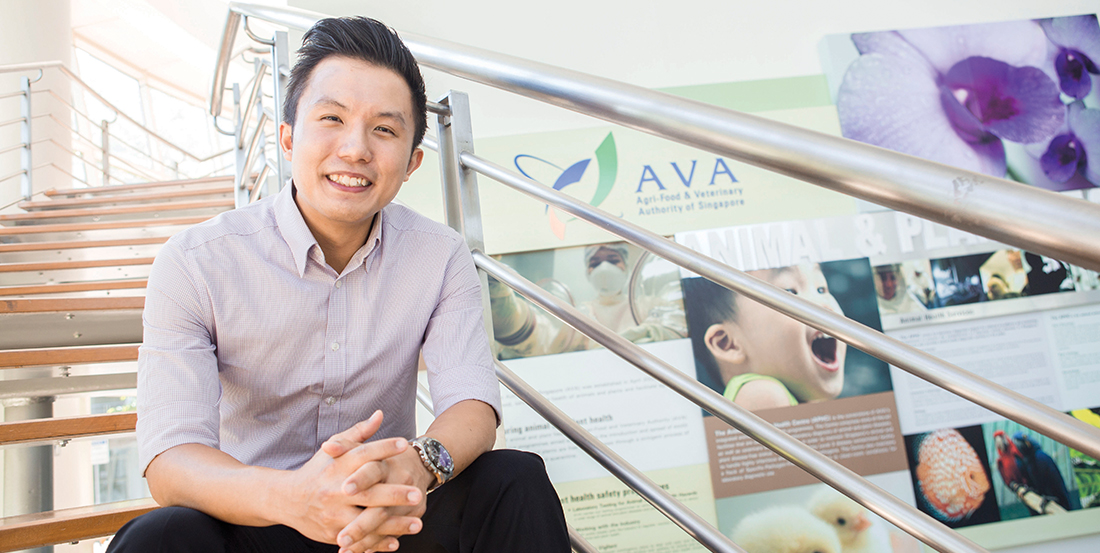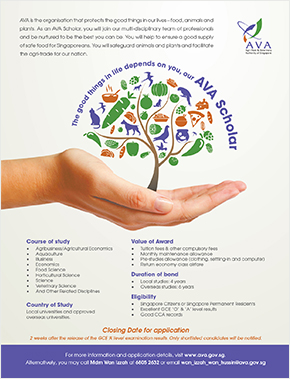The Agri-Food and
Veterinary Authority of
Singapore (AVA) ensures
a resilient supply of
safe food, safeguards
animal and plant health,
safeguards animal
welfare, promotes
agrotechnology, and
facilitates agri-trade for
Singapore’s well-being.
AVA scholar and animal-lover
Dr Han Zi Yang
tells us more about his
multi-faceted role.
Singapore’s limited arable land supply
means that the Republic needs to look
abroad to feed the people. To ensure
imported food supplies are both diverse and
safe for public consumption, AVA is constantly
on the look-out for new sources of safe and
quality food. AVA also supports and regulates
the technologically-advanced farms in
Singapore that provide us with a modest supply
of eggs, fish and vegetables. This guarantees
Singapore a certain level of self-sufficiency in
food.
But ensuring food safety and supply is only
one aspect of AVA’s extensive portfolio. AVA
also pays particular attention to animal and
plant health. Through proper surveillance and
inspection, AVA is constantly on the alert to
prevent animal disease outbreaks, thereby
protecting Singapore from potential animal
diseases such as Rabies and Avian Flu.
Veterinarian Dr Han Zi Yang is part of this
food safety and animal health regime in AVA’s
Surveillance and Inspection Department. The
AVA Undergraduate Scholar has been with AVA
for just under two years but is already brimming
with exciting insights in this field.
Growing his love for animals
“Most people don’t know this, but we have
over 100 coastal fish farms, three poultry farms,
two quail farms, three cattle farms and even
a goat farm and a crocodile farm. A typical
day will see me heading to a farm to conduct
surveillance work, collecting samples for food
safety testing, and checking on the health of
animals – the variety of farms keeps me very
busy!” Dr Han tells us with a laugh.
Dr Han developed a love for animals (he
owns two rabbits) in his younger years, and
the gregarious young man had a childhood
ambition to become a zookeeper. Dr Han also
remembers his regular visits to the zoo with
great fondness, and he also recalls reading up
about a diverse series of animals and watching
numerous animal documentaries.

Dr Han Zi Yang
AVA Undergraduate Scholar
Designation:
Veterinarian
Studied:
Bachelor of Veterinary Science,
First-Class Honours and Dean’s List Recipient,
University of Melbourne, Australia
“I thought it’d be enriching to be able to
marry my interest in animals with my studies
in Science in Junior College, and this led me to apply for the AVA scholarship,” Dr Han muses.
With the support of the AVA scholarship, Dr Han
pursued his Bachelor of Veterinary Science in
Australia’s University of Melbourne.
A unique university experience
Dr Han’s university experience was nothing
short of eventful. In his early undergraduate
years, vet students were required to participate
in farm work during the holidays to learn the
ropes of farming. Working on a dairy farm
required him to wake up at 4am daily to execute
tasks such as milking cows, preparing hay
and animal feed as well as maintaining the
paddocks. He spent part of his holidays out in
rural Australia, working on pig and poultry farms
for days on end.
In addition to his participation in unique
farming activities, Dr Han was also attached to
vet clinics and hospitals during his final years in
university. His time as a veterinarian understudy
gave him the chance to be attached to the
Werribee open-range zoo, where he gleaned
insights on zoo medicine and the challenges
of managing the health of zoo animals kept in
an open-range setting. He adds, “I remember
having to examine the animals from afar on our
vehicles using a pair of binoculars. I had a hard
time recognising the zebras and calling them
by their names, while the zoo vets and keepers
were doing it with ease.”
“I also remember performing multiple
veterinarian roles – for instance, week one
would see me performing surgery on small
animals; in week two, I would be in rural Australia
working on large animals such as horses; and in
week three, I would be back at the University’s
hospital for my emergency rotation.”
Some of Dr Han’s fond memories include
receiving phone calls in the middle of the night
and venturing out to farms in the cold with only
the guide of minimal light to help cows with
calving (the process of giving birth) difficulties.
Delivering a live calf at the end of the day was
always a satisfying experience despite the cold
and fatigue.
"The life of a vet is undoubtedly exciting. There is never a dull moment with the diverse roles that AVA scholars are expected to play."
He adds, “Communication skills are critical
for a vet. We had to ask our clients (farmers
and pet owners) all the right questions to elicit
proper responses, because our animal patients
are after all unable to voice their feedback.
Good responses aid in our understanding of an
animal’s situation and help us better perform
our procedures. It was rewarding to see that
farmers and pet owners are extremely thankful
after an animal recovers.”
An exciting career
Dr Han's university experience gave
him numerous opportunities to hone his
communication skills, especially when
communicating with stakeholders ranging
from pet owners to farmers and Aboriginal
Australians. These rich experiences have
helped him develop essential communication
and interpersonal skills which he applies in his
current work at AVA.
He makes it a point to build good
relationships with local farmers when ensuring
that their farming activities are in line with AVA’s
regulations. Dr Han tells us, “Singapore has
limited farm land and it is our responsibility to
ensure our farmers fully optimise it. We also
encourage them to go beyond merely producing
and to constantly develop their technical
expertise. Our close relationships with local
farmers allow us to better understand their
needs and to offer bespoke support and advice
that meets their needs.”
He tells aspiring AVA scholars that, as a
veterinarian and a Public Officer, it is imperative
to be tenacious, be daring to try new things and
be willing to make mistakes with the purpose
of learning from them. He adds, “The life of a
vet is undoubtedly exciting. There is never a
dull moment with the diverse roles that AVA
scholars are expected to play. If you wish to
improve animal health and contribute to AVA in
new and novel ways, then my best advice is to
simply go for it!”


